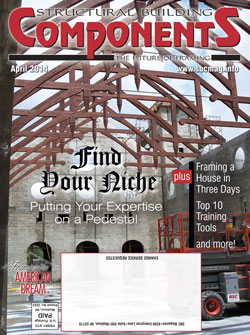Grooming a New Generation of Leaders
Grooming a New Generation of Leaders
At the last SBCA Open Quarterly Meeting (OQM), I was approached by one of our association’s long-standing and active members, Mr. Ken Cloyd. With a concerned look, he asked me a question for which I didn’t know an answer. He wanted to know where all the young leaders in our industry were and how we were going to get them engaged in the association to help promote the best interests of our industry. As I looked around the meeting room, I realized that, as someone in his 40s, I was the “baby” in the room! This was startling, to say the least!
You’ve undoubtedly read or heard in the news the many stories about the residential construction industry’s labor shortage. The housing bust lasted too long…way too long…too many skilled and experienced people in our industry were forced to move on. We lost a great deal of mentors and leaders to “early” retirement. We lost others to industries that weren’t impacted as deeply as housing. So many truss plants went out of business and their former employees couldn’t wait around for our industry
to recover.
Even though our company survived, we were forced to cut way back on our number of employees. In many cases, we had to let go our least experienced employees, which were typically our youngest workers. As a result, in just a few years, the collective age of our workforce got much older. I’m sure most of you had similar experiences.
Yet, if your facility is anything like ours, the young people we kept were some of our most promising. We need to focus on these individuals now and groom them to become the next generation of leaders in our companies and in our industry. But how do we start to make that happen? I suggest beginning with these five steps:
1) Choose Wisely
The first challenge in growing the next generation of leaders is choosing the right individuals to mentor. Do you go after the hardest workers? The brightest? The most well-liked? Personally, I’d choose the most dedicated. If you have a young person who understands the value of our industry and the rewarding career it can offer, they get the big picture. I’d argue these are the people you can count on to be committed to take on leadership responsibilities.
2) Mentor Closely
Building leaders is a long-term process. Just like raising kids, it is accomplished through a million small conversations, learning moments, completed tasks and informal evaluations with feedback. You can’t turn someone into a leader by being passive. You have to be engaged with them every day, looking for every opportunity to help them grow.
3) Train Continually
I know it’s a cliché, but every moment is a teaching moment. If you’re mentoring an individual, or group, to become part of your company’s leadership team, there has to be a commitment on your part to ensure they learn everything they can about their job and the business. If you’re training a future leader to be a line foreman, expose them to truss design, sales and dispatch. Help them understand and appreciate where their current job responsibilities fit within the whole process; they’ll make better decisions now and will be more well-rounded for the future.
As part of that training, it also doesn’t hurt to get them thinking about community service. Offer them opportunities to attend SBCA Chapter meetings, give presentations to building officials, and travel to the BCMC show and SBCA OQMs. The more they are immersed in the culture of our industry, the more they will view this as a life-long career as opposed to their current job.
4) Test Regularly
In order to lead, they have to prove they know what they’re doing. Don’t hesitate to put their knowledge and skills to the test—make them prove themselves. I think about how many times my dad asked me to do something and I thought, “How in the world am I going to do that?” Once I found a way and got it done, I had a lot more confidence in myself, and so did he.
5) Communicate Openly
Of course, you have to openly communicate your expectations and your evaluation of their performance. In turn, you have to solicit their evaluation of you, the company and their coworkers. If you aren’t happy, or vice versa, everyone needs to know so you can work to fix it. Being unsatisfied with something and hoping it will fix itself is a practice in futility.
Before I wrap this up, here’s one more cliché: leaders aren’t born, they’re made. It’s our responsibility to start making them. If we don’t commit to doing it now, soon there won’t be anyone in our companies, or our association, who will ensure the truss industry continues to thrive and remain relevant in the residential construction industry.
 SBC Magazine encourages the participation of its readers in developing content for future issues. Do you have an article idea for an upcoming issue or a topic that you would like to see covered? Email your thoughts and ideas to editor@sbcmag.info.
SBC Magazine encourages the participation of its readers in developing content for future issues. Do you have an article idea for an upcoming issue or a topic that you would like to see covered? Email your thoughts and ideas to editor@sbcmag.info.

